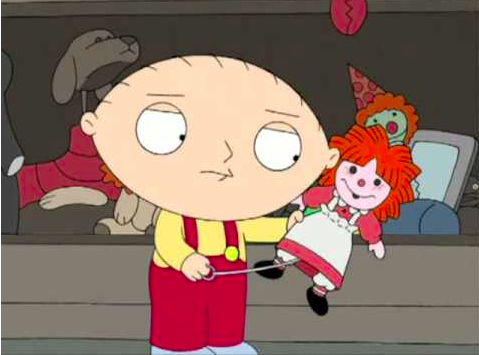Perhaps one of the most useful barometers of the social status of the menstrual cycle is the frequency and nature of its representation in public media. In the 1950s the three major TV network forbade the airing of ads for menstrual products, or “catamenial devices,” as they were called, before 9 a.m. or after 3 p.m. in order to protect children and men from exposure to these unpleasant objects. In the ensuing decades as the ubiquitous blue liquid was sopped up by quilted pads and puffy tampons, a few daring programs included menstrual elements as plot devices or elements of humor, most notably episodes of All in the Family in which Edith enters perimenopause and another in which Gloria misses a period prompting a pregnancy scare.
My own research has taken me from Prince Charles’ menstrual media mishap and the period’s presence in various Carrie incarnations through a wide variety of literary, cinematic, and televised incidents and all the way back to biblical stories that included menstrual elements.
Presently, though far from frequent, the period now makes regular appearances in TV series and feature films. From being employed as “the menopause defense” in a murder trial on Law and Order to palace intrigue and marital plot in Game of Thrones to adolescent disgust in Superbad to a challenge to one’s masculinity in Martin Scorsese’s The Departed to family drama on nearly every sit-com that has a young girl character, the menstrual cycle has steadily gained acceptance as a subject worthy of inclusion on tube and screen.
That is not to say that all of the period appearances are enlightened or lacking in previous eras’ negative slant. This month’s explorations of menstrual media will strive to examine the full range. This is not a new topic for the SMCR blog as over the past five years we have often posted many commentaries on this very subject. In fact, because we consider this topic so important, and because we believe that some of those earlier posts deserve more exposure, this month’s posts will include several of those items, among them Laura Wershler’s three-part examination of how menstruation underscores the plot of Ann Patchett’s novel State of Wonder.
So let us begin with a look at what, at one time, would have been the most unlikely setting for frank–even rude and racy–period references: the animated cartoon. Once a genre exclusively designated for children’s entertainment, animated films and TV series have become popular venues for adult viewing, echoing the rise of the graphic novel in print media. Shows like King of the Hill, The Simpsons, Family Guy, and, most path-breaking of all, South Park, are designed for adult consumption, mostly young male viewers. All four of these series (and their less successful genre companions) focus mainly on male characters and their struggles with authority, identity, and a general bewilderment in the face of a perfidious world. All of them are comedies, so when menstrual elements are introduced they are played for laughs, though the laughter is often nervous and insecure.
 Consider one small example that a former student of mine, Robert Newman, discovered. In a 2007 episode of Family Guy, the baby Stevie Griffin is playing with his “On the Raggedy Ann” doll. Here’s the exchange:
Consider one small example that a former student of mine, Robert Newman, discovered. In a 2007 episode of Family Guy, the baby Stevie Griffin is playing with his “On the Raggedy Ann” doll. Here’s the exchange:
STEWIE: Oh look, an On-The-Raggedy Ann doll. (pulls the string)
DOLL: It’s water weight you bastard! (he pulls the string again)
DOLL: Get off me, I’m not your whore! (he pulls the string again)
DOLL: (crying) I’m sorry, I’m just so sad.
STEWIE: Well, I guess I can still play with it three weeks out of the month.
This simple scene both sends up the PMS stereotype and legitimizes the notion of its existence. Yet at the same time it puts the period into play as a topic for satire, drama, and commentary.
This month’s posts will try to give exposure to the full range of period presence in popular media. However, it will be far from encyclopedic in its coverage as topical research in popular media is notoriously difficult and invariably omits items worthy of inclusion. So, readers are invited, urged in fact, to send it their own sightings of the period’s presence you have encountered.

